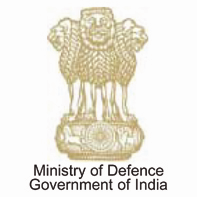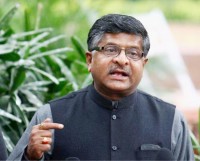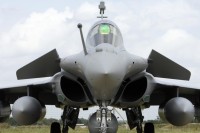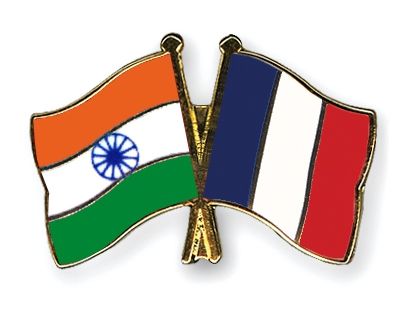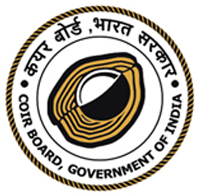The Centre has initiated a major move to give security infrastructure along the strategically critical India-China border a significant boost. As part of the plan, the government has agreed in principle to put in place state-of-the-art powerful radars and high intensity thermal sensors to check Chinese intrusion both by air and land routes.
Sources said the sophisticated thermal sensors can help detect movement of troops and vehicles from at least a few kilometres even in the dark and transmit signals to a control room or an outpost.
Intrusion by Chinese forces along the border has remained an area of concern for the security establishment.
After the NDA government assumed power at the Centre, it has attached high priority to securing the borders.
Hectic deliberations have been going on among multiple agencies and ministries within the government over the last few days over what steps should be initiated.
One of the issues flagged by security agencies during the meetings was the lack of technological equipment close to the border that can help provide an advance warning of possible intrusion attempts by the Chinese.
Sources said that a blueprint for installing the hi-tech equipments was being worked out.
“The territory along the Indo-China border is extremely hostile and it is virtually impossible to patrol the region on foot. So we have to rely on technology,” a government functionary said.
Radars & Sensors to check China intrusion
The Angel Investing Wishlist From Budget 2014 : Pls Fix
[Editorial Notes : The new government will soon announce Budget 2014 and we certainly would like to believe that the new budget will also focus on giving wings to India’s entrepreneurial energy. V.Shankar, Angel Investor at The Chennai Angels shares key points that the new government should definitely fix.]
Angel Investor Groups play an important role in the promotion of Entrepreneurship in the country. In addition to capital, they provide mentoring, access to networking and access to market, and these are inputs that a startup desperately needs.
Angel Investing has been adversely impacted by well known recent regulatory changes. These need to be reviewed to re-energise Angel Investing and promote entrepreneurship.
CWC to provide storage to Central Medical Services Society
Central Warehousing Corporation (CWC) signed a MOA with the Central Medical Services Society (CMSS), an institution under the Ministry of Health and Family Welfare, GOI, for providing warehousing facilities including for walk in chambers and walk in freezers for storage of drugs, pharmaceuticals, vaccines and other health sector goods.
CWC will provide 2.30 lakh sq. ft. of warehousing facilities at 21 locations in 20 States and 1 Union Territory and depending upon additional requirement, the facilities will be augmented.
The MOA, valid initially for five years, effective from July 1, 2014 was signed by B B Pattanaik, Managing Director, CWC with Navneet Verma, Director General & CEO, CMSS on 30th June, 2014 in the presence of Functional Directors and senior officers of both the organizations.
Arun Jaitley says armed forces’ demands for more funds to be accepted in Union Budget
The “slow pace” of acquisition of weapon systems is a matter of concern and the new government will work towards “expediting” the procurement process to meet the requirements of the armed forces, Defence Minister Arun Jaitley said here today.
After attending the Naval Commanders’ Conference, he hinted that demand of the armed forces for more funds in the Union Budget was likely to be accepted as the “entire resource of the country, notwithstanding various pressures, has to make available a significant amount for those in defence of the country”.
“The key subject matter of concern appears to be the slow pace of acquisition of whatever equipment and assets are required. The Navy has highlighted that…. Hope of the forces is that their requirements should be fulfilled and the process should also be expedited. The effort of the government would be to work in that direction,” Arun Jaitley said.
Talking to reporters after a detailed interaction with the top brass of the Navy at the commanders’ conference, the Minister said, “There are several decisions in the pipeline and I think there is a good case for these processes to be expedited.”
The Navy has several acquisition projects stuck for many years due to slow procurement process, including the Rs 6,000 crore 16 multirole helicopter project and the acquisition of torpedoes for the Scorpene submarines.
Its tender for acquiring six new submarines under Project-75 India, estimated to cost over Rs one lakh crore, is also stuck as the government has to alter a 1999 decision to build all future submarines only indigenously.
The Navy is also waiting for final clearance to acquire 16 mine countermeasure vessels from a South Korean firm which has been stuck after complaints were filed against the fairness of the process under the previous government.
On whether the new Government will do a full review of the defence acquisition process to expedite procurements, Jaitley said, “I would not use the word full review but even under the present procedures also, expediting processes is still possible. Every file need not move up and down indefinite number of times.”
GovTech India : The New Government is Serious About These 3 Things
India’s new IT Minister Ravi Shankar Prasad spent a couple of hours listening to product startups and folks from ISPIRT yesterday. Earlier in the day, he spent time with the technology services companies.
The 3 key takeaways? Government is serious about
Broadband: The National Optical Fiber Network, Local manufacturing of electronic goods and E-governance reforms.
Read More : http://www.nextbigwhat.com/3-things-technology-new-government-serious-297/
MOD raises concerns over the cost escalation in jet deal
As the French foreign minister Laurent Fabius met Indian political leadership, including prime minister Narendra Modi, pressing for sealing the multi-billion Rafale combat aircraft deal, New Delhi has raised serious concerns over the cost escalation of the fighter jet deal. Struggling to pay the heavy cost of the deal, the ministry of defence (MoD) is considering an option of down-sizing the deal from 126 to 80 fighter jets.
According to officials, who are privy to the development, defence ministry has asked the French government to revise the price structure because the deal has gone much beyond the expected lines. And during course of negotiations with the Dassault, which manufactures Rafale jets, the defence ministry has been asking for price revision. Due to difference of opinion, the cost negotiation committee, which was set up in February 2012 to work out the modalities for the deal, has not been able reach conclusion and the committee is yet to submit its report to the ministry.
Officials claim that in 2007, when the tender was floated, the cost of the programme was $12 billion. When the lowest bidder was declared in January 2012, the cost of the deal shot up to $18 billion (Rs1.08 lakh crore). And now with inclusion of transfer of technology, life cycle cost and creating assembly line, the deal has virtually cross whopping $20 billion.
A top official told dna that if the government signs the deal in the next couple of months, it has to pay advance payment of at least $1.5-2 billion (Rs.9- 12,000 crore) to Dassault. And for the newly-elected BJP-led NDA government will have to compromise on other defence equipment, as major chunk of defence budget will go in for the advance payment. And it is also believed to understand that new government is also not comfortable with the life cycle cost method adopted by the previous UPA-II government and even a senior BJP leader and former finance minister Yashwant Sinha had objected to the life cycle criteria.
“Cost escalations and disagreements over production sharing with Hindustan Aeronautics Limited(HAL) has led to the delay in freezing the contract. French have been asked to re-look at the price factor,”said an officer.
IAF officials maintain even if the deal is signed by the end this year, first lot of Rafale aircraft will arrive India by 2017. And by the time, IAF has to phase out its MiG 21 squadrons.
The air force is seeking to replace its ageing MiG-21s with a modern fighter and MMRCA fits between India’s hig-end Sukhoi-30MKIs and its low-end Tejas LCA lightweight fighter. The IAF has a sanctioned strength of 45 fighter jet squadrons. However, it only has 30 squadrons operational as old aircraft have been retired.
Eighteen of the 126 planes will be purchased directly from Dassault, while Hindustan Aeronautics Limited will manufacture the other 108 under a licence, at an upcoming facility in Bangalore.
Kaspersky Internet Security rated 1st stood up to an independent 6 month test and took 1st place
Kaspersky Internet Security was rated as the best protection solution following an endurance test carried out from September 2013 to February 2014 by the experts of the independent laboratory AV TEST. Kaspersky Lab’s product achieved top scores for malware detection while maintaining a lower system load than any other tested product.
AV-TEST’s endurance test is an extended study in which different internet security suites are tested over three two-month periods on three different operating systems — Windows XP, Windows 7 and Windows 8.1. This testing method helps to find the best solution by analyzing its effectiveness on a long- term basis, unlike traditional tests that can only demonstrate the capabilities of the protection at a given moment in time.
The experts evaluated 24 security suites from different vendors in three categories. The first category, Protection, tested the combined ability to detect a reference set of malware and to identify new pieces of previously unknown malware. The second one, System Load, demonstrates impact of the security suite on system performance and measures delays in the installation or execution of programs, website responses and data downloads. The last category, Usability, assesses the correct identification of legitimate programs and websites.
Kaspersky Internet Security suite boasted the best results over the six months of testing and was able to score 17.8 of a maximum possible total of 18 points. It got 6.0 out of 6.0 points in Usability and Protection categories, detecting 100 % of 60,000 known pieces of malware and identifying all of about 400 samples of zero-day malware in a real-world test conducted by visiting recently infected websites and opening suspicious e-mail attachments. Furthermore, Kaspersky Internet Security also got 5.8 out of 6 in System Load, beating its nearest rival by 0.3 points.
“Users of modern security suites don’t want to be disturbed either by viruses or by antiviruses. The solution’s ability to avoid excessive drain on system resources and avoid false positives is just as important as its primary function of detecting and neutralizing malware. Kaspersky Internet Security’s impressive results in this test reflect the optimal comfort level our customers enjoy in addition to unquestionable security for their systems,” commented Oleg Ishanov, Director Anti-Malware Research, Kaspersky Lab.
India & Israel discuss Defence Deals
Military deals including a key missile development programme and procurement of two more AWACS aircraft are understood to have been discussed between India and Israel during Defence Secretary R K Mathur’s ongoing three-day visit to Tel Aviv.
The two sides have close defence ties and Israel is one of the largest weapons suppliers to India after Russia and has provided it with sophisticated systems such as the long-range radars for the anti-ballistic missile defence system and the Airborne Early Warning and Control Systems (AWACS) aircraft.
The Long Range-Surface to Air Missile (LR-SAM) project being jointly developed by the DRDO and the Israeli Aircraft Industries (IAI) has been delayed by several years due to some reasons and its status is understood to have been discussed by the two sides.
France concerned over delay in JV
Even as France remained confident over a deal to supply 126 Rafale fighter jets to India, its foreign minister Laurent Fabius expressed concern over a prolonged delay of an Indo-French joint venture to develop short-range, surface-to-air missile (SR-SAM) project.
In 2007, India’s DRDO and France’s MBDA began talks on a Rs 30,000 crore project named ‘Maitri’ to jointly development and produce the short-range, surface-to-air missile. After six years of negotiations, in February 2013, a MoU to co-develop these SR-SAM was signed.
The venture aims to fill the capability gap of air defence with the Indian Air Force and Indian Navy; the Navy and the Air Force are estimated to require at least 100 Maitri systems each. Sources say that the signing of SR-SAM project will demonstrate the NDA government’s priority.
“The French delegation headed by their foreign minister raised concern over the delay of critical SR-SAM deal, which has been in limbo for years.
S N Tripathi gets additional charge as Chairman of Coir Board
S N Tripathi IAS, a joint secretary in MSME Ministry, has been given additional charge as Coir Board chairman,on expiry of the tenure of the Chairman, Coir Board, a Statutory Body under the Ministry of MSME.






